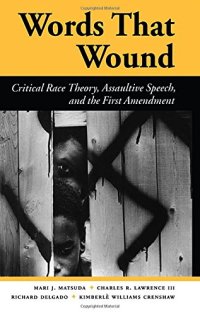
Ebook: Words That Wound: Critical Race Theory, Assaultive Speech, and the First Amendment
Author: Mari J. Matsuda
- Tags: Civil Procedure, Rules & Procedures, Law, Social Sciences, Children’s Studies, Communication & Media Studies, Criminology, Customs & Traditions, Demography, Disaster Relief, Emigration & Immigration, Folklore & Mythology, Gender Studies, Gerontology, Holidays, Human Geography, Human Sexuality, Library & Information Science, Linguistics, Methodology, Museum Studies & Museology, Philanthropy & Charity, Popular Culture, Pornography, Poverty, Privacy & Surveillance, Reference, Research, Social Work, Specific Demographics, Urba
- Series: New perspectives on law culture and society
- Year: 1993
- Publisher: Routledge
- Edition: 1
- Language: English
- epub
Words, like sticks and stones, can assault; they can injure; they can exclude. In this important book, four prominent legal scholars from the tradition of critical race theory draw on the experience of injury from racist hate speech to develop a first amendment interpretation that recognizes such injuries. In their critique of first amendment orthodoxy,” the authors argue that only a history of racism can explain why defamation, invasion of privacy, and fraud are exempt from free-speech guarantees while racist and sexist verbal assaults are not.The rising tide of verbal violence on college campuses has increased the intensity of the hate speech” debate. This book demonstrates how critical race theory can be brought to bear against both conservative and liberal ideology to motivate a responsible regulation of hate speech. The impact of feminist theory is also evident throughout. The authors have provided a rare and powerful example of the application of critical theory to a real-life problem.This timely and necessary book will be essential reading for those experiencing the conflicts of free-speech issues on campusstudents, faculty, administrators, and legislatorsas well as for scholars of jurisprudence. It will also be a valuable classroom tool for teachers in political science, sociology, law, education, ethnic studies, and women's studies.